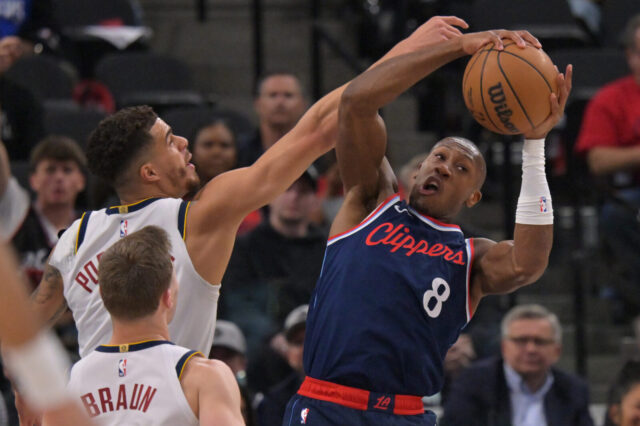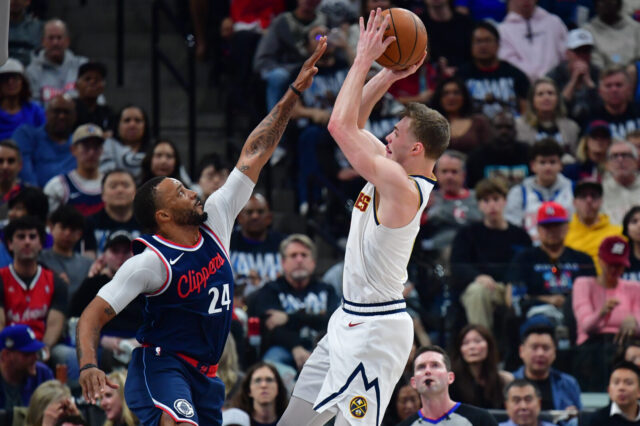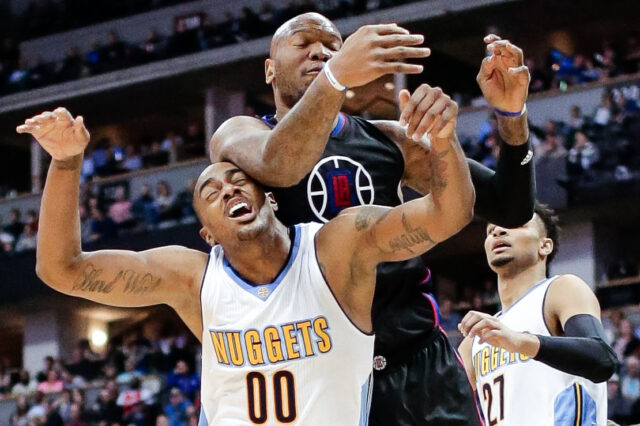The boos rained down from the stadium like embers in a forest fire, and felt nearly as hot. The object of their fire and ire was buried deep in prayer.
Over twenty years later, a picture of that moment, or one much like it, is displayed on a sizable billboard on La Brea Avenue here in Los Angeles. The photo on the billboard is exactly the same as the one that leads off this article, a well-positioned Associated Press shot. A man in uniform with his hands before his face, with what is obviously a large crowd of people around him. There is also an American flag that is large enough to dominate the background several yards behind him as the other major component of the frame. Even if you do not know what you're looking at, it is obvious that these two things are our photo's heroes. Whether they are companions or point and counterpoint is left to the imagination. There are no words accompanying the image, and the viewer is left to interpret the meaning of the picture as he sits in traffic. Without any context, I hear it can be vexing for the curious mind. But I was not without context, and for good reason.
As a Denver Nuggets fan, you’re probably more familiar with the circumstances of the picture than most Angelinos, with former Nugget Mahmoud Abdul-Rauf standing in contemplation and prayer while the remainder of his teammates and the fans around him stand and honor our National Anthem, a song celebrating the hard-fought liberty which allows Abdul-Rauf to make the choice he did – in the land of the free, and the home of the brave. The booing never happened during the anthem itself, only before or after, but it was very clear that many fans did not appreciate Abdul-Rauf’s stance. Whether you support his choices or not, freedom and bravery were required in heavy doses when standing up for his beliefs in the face of a less-than-supportive group of fans.
What a difference 20 years makes. Or does it? Similar issues of religious freedom currently occupy today's news, and opinions are still diverse and passionate. Though the Abdul-Rauf story dates back to 1996, the NBA seems to have many instances of being at the forefront of these social hot button issues, with the controversy, legality, and moral quandaries to match. For instance…
In 2013, Jason Collins became the first gay athlete to reveal his sexuality while still playing the game in one of the four major sports. For the most part, Collins was well accepted and embraced by teammates, fans, and especially the league. Other athletes have followed suit since, much of it happening right as national popular opinion, political openness, and legal rights landscapes have all shifted. Collins may not have been the primary catalyst in this shift, but his role in being someone to speak up in a culture that had been rather silent is not to be ignored in helping that shift along.
Race relations for the league have been a mixed bag, but have long been a topic. In 2014, former Los Angeles Clippers owner Donald Sterling was suspended and eventually removed from team ownership due to racist comments his mistress had recorded and shared with the media.
In 2004, after a melee in the Detroit stands in an Indiana Pacers–Detroit Pistons matchup, many national writers were convinced that much of the tension building in stadiums was attributable to race relations, as USA Today’s Ian O’Connor wrote:
"Commentators are examining the widening gulf between overwhelmingly black NBA teams and the white fans who follow them. It's healthy to ask tough questions about the uneasy state of race relations in sports and beyond; the more these issues are addressed in public forums, the better the chance of not having to examine them in the future… Sometimes we see race when we should simply see foolishness and hate. That's the product of living inside a sports culture where equal opportunity on the coaching, executive and ownership levels remains an elusive ideal."
In attempting to go back through the history of the NBA, there are seemingly countless moments in which the league was dealing with issues of race, racial equality, violence, rights, and more. But all is certainly not to the negative. The league has shown a commitment to opening up all tiers of the sport, with more progress hopefully to come. As that picture has diversified, the league has flourished. They have also looked more and more to their ownership, management, and stars in being a part of their community.
Today, there may not be a better example of how far the league has come in it's representatives being leading voices in the discussion of racial equality than former Nugget Carmelo Anthony. As one of the clearest and most dedicated voices in trying to heal the broad divide between minorities and police forces, Melo has told the press repeatedly that he felt compelled to become a part of a solution, championing a conversation while there is still time and ways to heal. Anthony has remained committed to keeping this subject in strong voice for the long haul, and his voice has been well heard thus far on both sides of the conversation, with New York City and 'Melo's hometown of Baltimore feeling the pain of the current rift. The challenge before him and everyone trying to help solve the issue is massive, a Gordian knot decades in the making. His stardom offers him a powerful platform to help ease tensions and get people talking about practical solutions.
To its credit, the league's player makeup is one of the most globally diverse in sport. Years ago, teams were thrust into working with an ever-larger melting pot of players, coaches, and fans who were drawn to the game, with global implications. In 2014, the NBA celebrated a new high-water mark, with over 100 international players a part of the league, a first in their history. Those players hailed from 37 separate countries, some of them war-torn and divisive. That makeup has given basketball a global presence that few other sports can boast, and a popularity that looks to be growing by the year. Nearly every region of the globe is embracing basketball.
When it comes to issues of gender, for years the NBA has been the only one of the four major sports to have what is literally a sister league, in the WNBA. The NHL is experimenting with a four-team WNHL, but at it's first anniversary, the league has barely entered this conversation. Though the WNBA came out of the gates slowly, and with a stumble or two, the teams have found an audience, and have consistently improved their community visibility and level of game play. Don't believe me? If you do not follow the WNBA, watch the USA Olympic Women's Basketball throw down their next demolition of another overmatched national squad, and tell me it doesn't remind you of the original USA Men's Dream Team. The USA women are putting on a clinic of shooting, passing, and shot blocking that is making for some embarrassing scores, and some chest-thumping watching. But even the NBA admits it has miles to go in making the women's league on par in scale of pay or profits as the men. ESPN carries the women's league games, but the deal for the most recent TV contract in 2013 was a six-year, 72 million dollar agreement. A reminder that the men's contract that just kicked in was for nine years and 24. Oh yeah, billion. 24 BILLION. Obviously, these numbers are primarily predicated on popularity and revenue streams, but wow is that a big delta.
I, for one, admire that the NBA has found such diversity on so many levels. They truly seem to take their role in social and community issues very seriously. But it is also not a league without faults or mistakes, today or across it's history. That is sort of a given when you add humans into the mix.
Given today's political and social climate, and with so many of these issues burning hot in conversation: race, religion, gender equality, sexual orientation, community, humanity, and more, does today's NBA help lead the conversation on these difficult and divisive issues facing us all? Or is basketball simply working their way through the morass with all the rest of us, sometimes stumbling as they go? My inner optimist believes it's the former, but I seek the wisdom of Nuggets Nation. What role does today's NBA play in the issues that face us as a country and world today?
a last note: This column contains more than a few of the writer's opinions, which are not necessarily those of this site or it's parent company. This post is obviously based upon issues which many people hold very passionate opinions about. I ask kindly that you keep any discourse respectful and decent to one other.
This content is no longer available.


